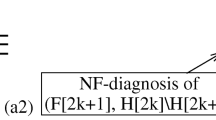Abstract
We consider decentralized diagnosis of discrete event systems in the conditional disjunctive and conjunctive architectures, where the local failure decision and local nonfailure decision are conditional, respectively. For each of these architectures, a notion of conditional codiagnosability, which guarantees the detection of any failure by conditional decentralized diagnosis within a bounded number of steps, has been defined in the literature. In this paper, we compute the minimum number of steps, called the delay bound, within which the occurrence of any failure can be detected in a conditionally codiagnosable system. The delay bound is important to evaluate the ability of diagnosis. In addition, we use the computed delay bound to synthesize local diagnosers with conditional decisions.























Similar content being viewed by others
References
Cabral FG, Moreira MV, Diene O, Basilio JC (2015) A Petri net diagnoser for discrete event systems modeled by finite state automata. IEEE Trans Autom Control 60(1):59–71
Cassandras CG, Lafortune S (2008) Introduction to discrete event systems, 2nd edn. Springer
Cassez F (2012) The complexity of codiagnosability for discrete event and timed systems. IEEE Trans Autom Control 57(7):1752–1764
Debouk R, Lafortune S, Teneketzis D (2000) Coordinated decentralized protocols for failure diagnosis of discrete event systems. Discrete Event Dyn Syst 10 (1&2):33–86
Jiang S, Huang Z, Chandra V, Kumar R (2001) A polynomial algorithm for testing diagnosability of discrete-event systems. IEEE Trans Autom Control 46(8):1318–1321
Kumar R, Garg VK (1995a) Optimal supervisory control of discrete event dynamical systems. SIAM J Control and Optim 33(2):419–439
Kumar R, Garg VK (1995b) Modeling and control of logical discrete event systems. Kluwer Academic Publishers
Kumar R, Takai S (2007) Inference-based ambiguity management in decentralized decision-making: decentralized control of discrete event systems. IEEE Trans Autom Control 52(10):1783– 1794
Kumar R, Takai S (2009) Inference-based ambiguity management in decentralized decision-making: decentralized diagnosis of discrete-event systems. IEEE Trans Autom Sci Eng 6(3):479–491
Moreira MV, Jesus TC, Basilio JC (2011) Polynomial time verification of decentralized diagnosability of discrete event systems. IEEE Trans Autom Control 56(7):1679–1684
Qiu W, Kumar R (2006) Decentralized failure diagnosis of discrete event systems. IEEE Trans Syst Man Cybern Part A: Syst Humans 36(2):384–395
Qiu W, Kumar R (2008) Distributed diagnosis under bounded-delay communication of immediately forwarded local observations. IEEE Trans Syst Man Cybern Part A: Syst Humans 38(3):628– 643
Qiu W, Wen Q, Kumar R (2009) Decentralized diagnosis of event-driven systems for safely reacting to failures. IEEE Trans Autom Sci Eng 6(2):362–366
Ricker SL, Rudie K (2007) Knowledge is a terrible thing to waste: using inference in discrete-event control problems. IEEE Trans Autom Control 52(3):428–441
Sampath M, Sengupta R, Lafortune S, Sinnamohideen K, Teneketzis D (1995) Diagnosability of discrete-event systems. IEEE Trans Autom Control 40 (9):1555–1575
Schmidt K (2010) Abstraction-based verification of codiagnosability for discrete event systems. Automatica 46(9):1489–1494
Su R, Wonham WM (2005) Global and local consistencies in distributed fault diagnosis for discrete-event systems. IEEE Trans Autom Control 50(12):1923–1935
Takai S, Kumar R (2015) A generalized inference-based diagnosis framework for discrete event systems capturing both disjunctive and conjunctive decision-making. In: Proceedings of the 54th IEEE conference on decision and control, Osaka, pp 3522–3527
Takai S, Ushio T (2012) Verification of codiagnosability for discrete event systems modeled by Mealy automata with nondeterministic output functions. IEEE Trans Autom Control 57(3):798– 804
Wang W, Girard AR, Lafortune S, Lin F (2011) On codiagnosability and coobservability with dynamic observations. IEEE Trans Autom Control 56(7):1551–1566
Wang W, Lafortune S, Girard AR, Lin F (2010) Optimal sensor activation for diagnosing discrete event systems. Automatica 46(7):1165–1175
Wang Y, Yoo T-S, Lafortune S (2007) Diagnosis of discrete event systems using decentralized architectures. Discrete Event Dyn Syst 17(2):233–263
Wang Y, Yoo T-S, Lafortune S (2015) Erratum to: diagnosis of discrete event systems using decentralized architectures. Discrete Event Dyn Syst 25(4):601–603
Yamamoto T, Takai S (2014) Reliable decentralized diagnosis of discrete event systems using the conjunctive architecture. IEICE Trans Fundamentals E97-A (7):1605–1614
Yamamoto T, Takai S (2015) Online synthesis of conjunctive decentralized diagnosers for discrete event systems. IEICE Trans Fundamentals E98-A(2):650–653
Yin X, Lafortune S (2015) Codiagnosability and coobservability under dynamic observations: transformation and verification. Automatica 61:241–252
Yokota S, Takai S (2014) Computation of the delay bound in decentralized diagnosis of discrete event systems with conditional decisions. In: Proceedings of the 53rd IEEE conference on decision and control, Los Angeles, pp 5961–5966
Yoo T-S, Garcia HE (2008) Diagnosis of behaviors of interest in partially-observed discrete-event systems. Syst Control Lett 57(12):1023–1029
Yoo T-S, Lafortune S (2002) Polynomial-time verification of diagnosability of partially observed discrete-event systems. IEEE Trans Autom Control 47(9):1491–1495
Yoo T-S, Lafortune S (2004) Decentralized supervisory control with conditional decisions: supervisor existence. IEEE Trans Autom Control 49(11):1886–1904
Yoo T-S, Lafortune S (2005) Decentralized supervisory control with conditional decisions: supervisor realization. IEEE Trans Autom Control 50(8):1205–1211
Acknowledgments
This work was supported in part by JSPS KAKENHI Grant Number 15K06140.
Author information
Authors and Affiliations
Corresponding author
Rights and permissions
About this article
Cite this article
Yokota, S., Yamamoto, T. & Takai, S. Computation of the delay bounds and synthesis of diagnosers for decentralized diagnosis with conditional decisions. Discrete Event Dyn Syst 27, 45–84 (2017). https://doi.org/10.1007/s10626-016-0229-2
Received:
Accepted:
Published:
Issue Date:
DOI: https://doi.org/10.1007/s10626-016-0229-2




